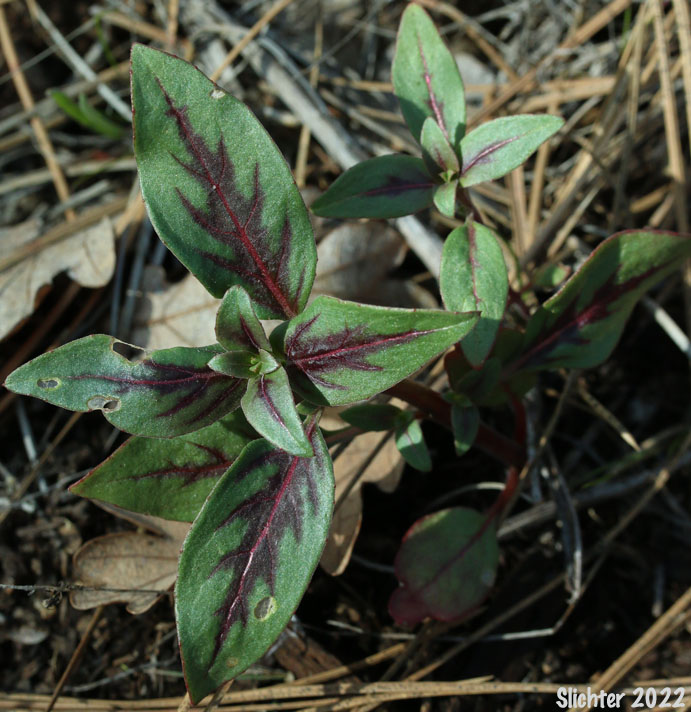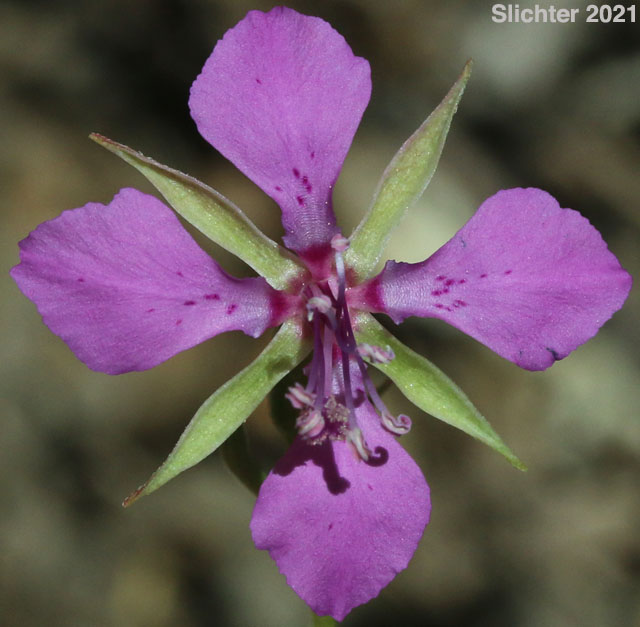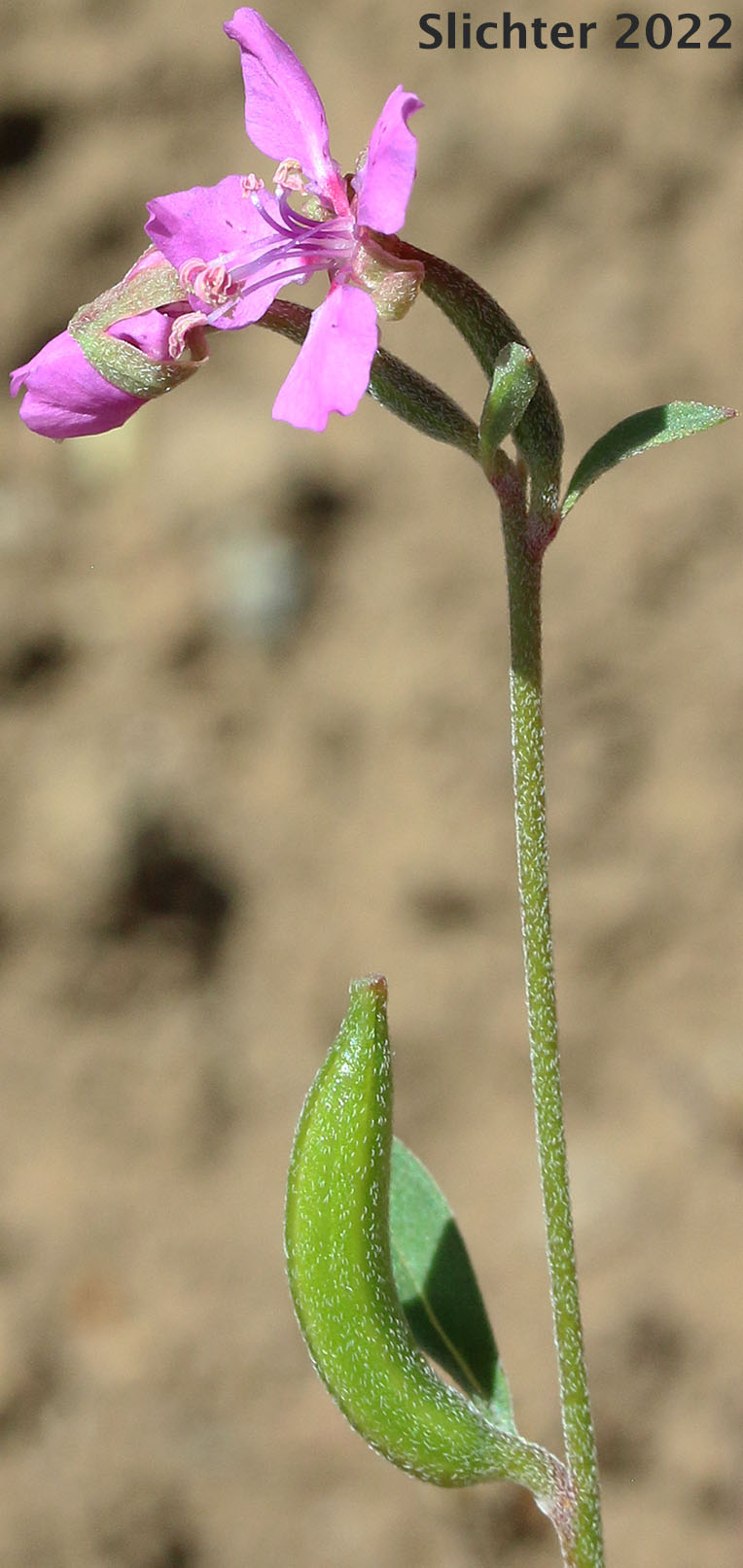[Clarkias and Godetias: The Genus Clarkia East of the Cascade
Mts. of Oregon and Washington]
Common Clarkia, Diamond Clarkia, Diamond Fairyfan, Rhombic-petaled Clarkia
Clarkia rhomboidea
 -
- 
Common clarkia as seen blooming atop Bickleton Ridge in the Bickleton Ridge Unit of the Klickitat Wildlife Area..........June 17, 2017. Note the broad, rounded petals which are widest towards the tip, and taper gradually to their base. Note also the long, narrow sepals.
 The photo at right shows a close-up side-view of the flower of common clarkia as seen at a DNR rock quarry at about 4100' atop the ridge that divides the Cougar Creek and Dairy Creek drainages at the southeastern corner of Mt. Adams........July 10, 2005. Note the long, elongated ovary which is inferior (arranged beneath the other floral structures), and the twisted stamens.
The photo at right shows a close-up side-view of the flower of common clarkia as seen at a DNR rock quarry at about 4100' atop the ridge that divides the Cougar Creek and Dairy Creek drainages at the southeastern corner of Mt. Adams........July 10, 2005. Note the long, elongated ovary which is inferior (arranged beneath the other floral structures), and the twisted stamens.
Characteristics:
Common clarkia is a sometimes weedy annual with simple stems
15- 100 cm tall. The herbage is glabrous to covered with fine, appressed hairs.
This wildflower has a sparse number of leaves. The leaves are largely subopposite
with a lanceolate to elliptic shape. The leaf blades are 2 to 7 cm long and
5 to 20 mm wide, with a long (1 to 3 cm) slender petiole. The margins are entire
to toothed.
The inflorescence is a few-flowered raceme. The unopened flower
buds are distinctly nodding (See the nodding bud behind the flower at right.).
The floral tube ranges from 1-3 mm long. The sepals are separate and separately
reflexed at flowering and they measure 5-8 mm long. The four petals of the corolla
are slightly irregular in size and shape. The 4 spreading petals are rose-purple
with purple dots. The petals are 5 to 10 mm long and 3 to 6 mm wide. The individual
petal shape is spatulate. There are 8 stamens while the white to purple stigma
lobes are oval and about 0.5 mm long. The capsule is 1.5-3.3 cm long.
Habitat:
Common clarkia is found in dry forest openings as well as amongst
sagebrush.
Range:
Common clarkia is found from southern British Columbia south
along the east slope of the Cascades in Washington, but on both sides of the
Cascades through Oregon to California. It is found eastward to eastern Idaho,
Utah and Arizona.

Leaves of common clarkia observed in open oak forest about one-half of a mile west of Tumwater Butte, Simcoe Mountains Unit of the Klickitat Wildlife Area......May 1, 2022. The blotchy red-purple color along the main veins of the leaves is fairly diagnostic for identifying this species (pre-bloom) in Washington and at least northern Oregon. Some other California Clarkia species can have this blotchy coloring on the leaves.
 -
- 
 -
- 
Additional close-up views of common Clarkia as seen along the valley trail about one and one-half mile uphill to the northwest of the Painted Rocks trailhead, Little Spokane River Natural Area..........July 5, 2011.
 -
- 
The photo at left shows the flower of common clarkia as seen at a DNR rock quarry at about 4100' atop the ridge that divides the Cougar Creek and Dairy Creek drainages at the southeastern corner of Mt. Adams..........July 10, 2005. Note the broad, rounded petals which are widest towards the tip, and taper gradually to their base. Note also the long, narrow sepals. The photo at right shows the flower of common clarkia as seen in open forest at Brooks Memorial State Park.....June 4, 2021.
 -
- 
Common clarkia blooming along the Fremont National Recreation Trail #160 on the east side of Crook Peak, Fremont-Winema National Forest......July 17, 2022.
 -
- 
Close-up views of common
Clarkia as seen one-half mile northwest of Ant Hill in the Umatilla NF........June
17, 2001. Note the central, light-colored lobe and the surrounding stamens with
wrinkled anthers.
Paul Slichter
 The photo at right shows a close-up side-view of the flower of common clarkia as seen at a DNR rock quarry at about 4100' atop the ridge that divides the Cougar Creek and Dairy Creek drainages at the southeastern corner of Mt. Adams........July 10, 2005. Note the long, elongated ovary which is inferior (arranged beneath the other floral structures), and the twisted stamens.
The photo at right shows a close-up side-view of the flower of common clarkia as seen at a DNR rock quarry at about 4100' atop the ridge that divides the Cougar Creek and Dairy Creek drainages at the southeastern corner of Mt. Adams........July 10, 2005. Note the long, elongated ovary which is inferior (arranged beneath the other floral structures), and the twisted stamens.